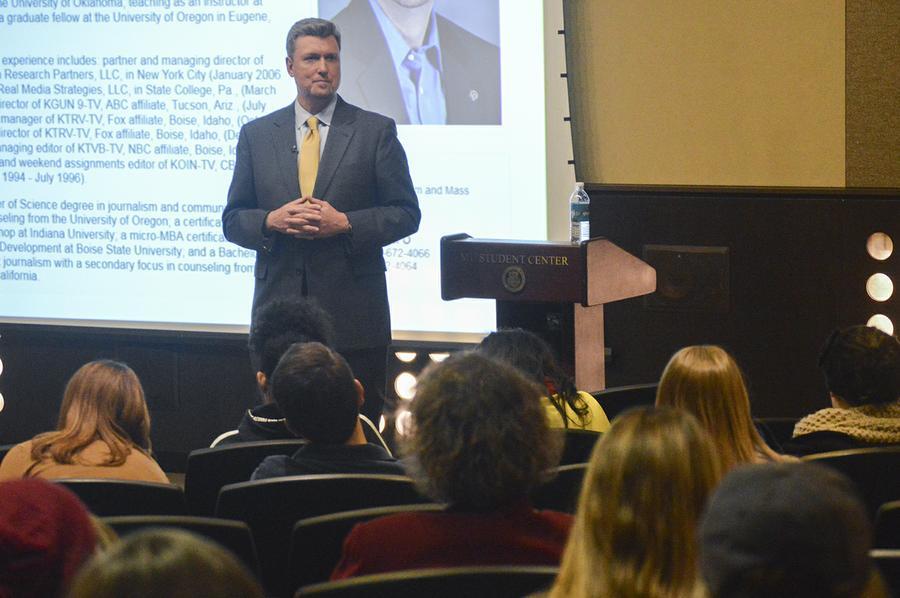The Missouri School of Journalism hosted its final open forum Thursday for the fourth candidate for the position of dean.
Thor Wasbotten was introduced by School of Law Dean Gary Meyers, who is the search committee chairman, before the forum in Leadership Auditorium.
Wasbotten is serves as the director of Kent State University’s School of Journalism and Mass Communications and was the assistant dean for Student Media and Online Operations.
He started his presentation with enthusiasm and his first topic was the future of the journalism and strategic communications at MU.
“I believe that the future of journalism and strategic communication will be in the engagement and involvement of targeted publics through multiple delivery channels with the purpose of informing, educating or persuading,” he said.
To Wasbotten, these two concepts differ. Engagement is the content journalists produce, which elicits an emotional connection to its audience. Involvement is the continued distribution of said content by the audience. Wasbotten said that without the emotional connection, involvement can not be achieved.
When journalists target different aspects of the public, involvement and engagement are at their highest.
“With the amount of data available, we are no longer just looking at demographics,” he said. “We must look at psychographics and ethnographics at a much deeper level.”
Wasbotten said students can best prepare for a future in either journalism or strategic communications by looking at how journalists provide information. To him, the most common ways are through digital means like social media, through data and storytelling.
His next topic was how to improve the quality of education while maintaining the value of a journalism degree from MU.
“We must challenge ourselves every single day to be relevant,” Wasbotten said. “If we approach our responsibility as educators, researchers and students, with a passion and understanding that is expected from this Missouri School of Journalism … a degree in journalism will remain one of the most prestigious.”
In order to continue to be on the forefront of journalism, Wasbotten said he wants to incorporate training beyond traditional media platforms, going as far to teach about ones not yet invented.
Something new Wasbotten wants to bring to MU, he said, is his idea of the “Missouri Conversation.” He would like to take events, such as terrorism, human relations and pollution, out to the community. He said he feels these topics, among others, affect everyone’s lives and therefore should be discussed between the public and the reporters.
“(The Missouri Conversation is) where we help our students, our communities and our publics throughout the state of Missouri and beyond, through dialogue, research, and storytelling,” Wasbotten said. “And if we do that, we will cement our position as the world’s premier school of journalism.”
When asked what the journalism school’s emphasis area would be, Wasbotten said he would focus on research and relationships within the industry.
“That helps provide data points for us to use to evolve the curriculum,” he said. “A conversation with the faculty who are the experts … will allow us to find these additional data points. Our faculty have been extremely responsive to the idea of remaining current and remaining relevant.”
Wasbotten stressed the importance of connecting with the students, stating he has an open door policy. He said he connected with the students at Kent State, but that there would be students at MU he would be able to form connections with as well.
When asked how to explain the value of a journalism degree to prospective students and parents, he said he believes the skills the Missouri School of Journalism teaches go far beyond just broadcasting and reporting. He said students are “adaptable and flexible in any industry.”
Wasbotten was asked to describe his leadership style and he categorized himself as being focused, strategic, able to make decisions and collaborate and also as wanting to be out and representing his school.
He said he is not afraid to talk in front of people.
“As dean, you end up being the face of the school and for us to energize our base, energize our donors and our friends and those we impact,” Wasbotten said. “That would end up being my job, to be a forefront of celebrating all the things we do.”
Associate Dean Lynda Kraxberger is a member of the search committee and she said Wasbotten has the experience needed to lead this journalism school.
“He has a true vision for what the next level of journalism education should be and while he has been at a smaller program, he knows what all the different pieces are that need to be in place in order to lead a bigger program,” she said.
Now that all the candidates — [Sonya Forte Duhé who visited campus Feb. 12](https://www.themaneater.com/stories/2015/2/13/journalism-dean-candidate-duhe-discusses-changing-/), [David Kurpius who visited campus Feb. 19](https://www.themaneater.com/stories/2015/2/18/journalism-dean-candidate-kurpius-wants-focus-stud/) and [Esther Thorson who visited campus Feb. 23](https://www.themaneater.com/stories/2015/2/24/journalism-dean-candidate-esther-thorson-discusses/) — have been heard from, Meyers said the decision will be debated amongst the search committee and the decision will ultimately be decided by Provost Garnett Stokes.
“I know she will hear from a variety of different constituencies, she’ll hear from the search committee, review the feedback that’s given electronically, and I’m sure she’ll talk to all the different categories of people who have met with the finalists to make her decision,” Meyers said.
Meyers said he doesn’t know when the decision will be released, but he is hoping it is within the next month.














